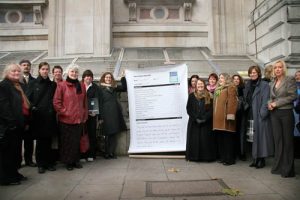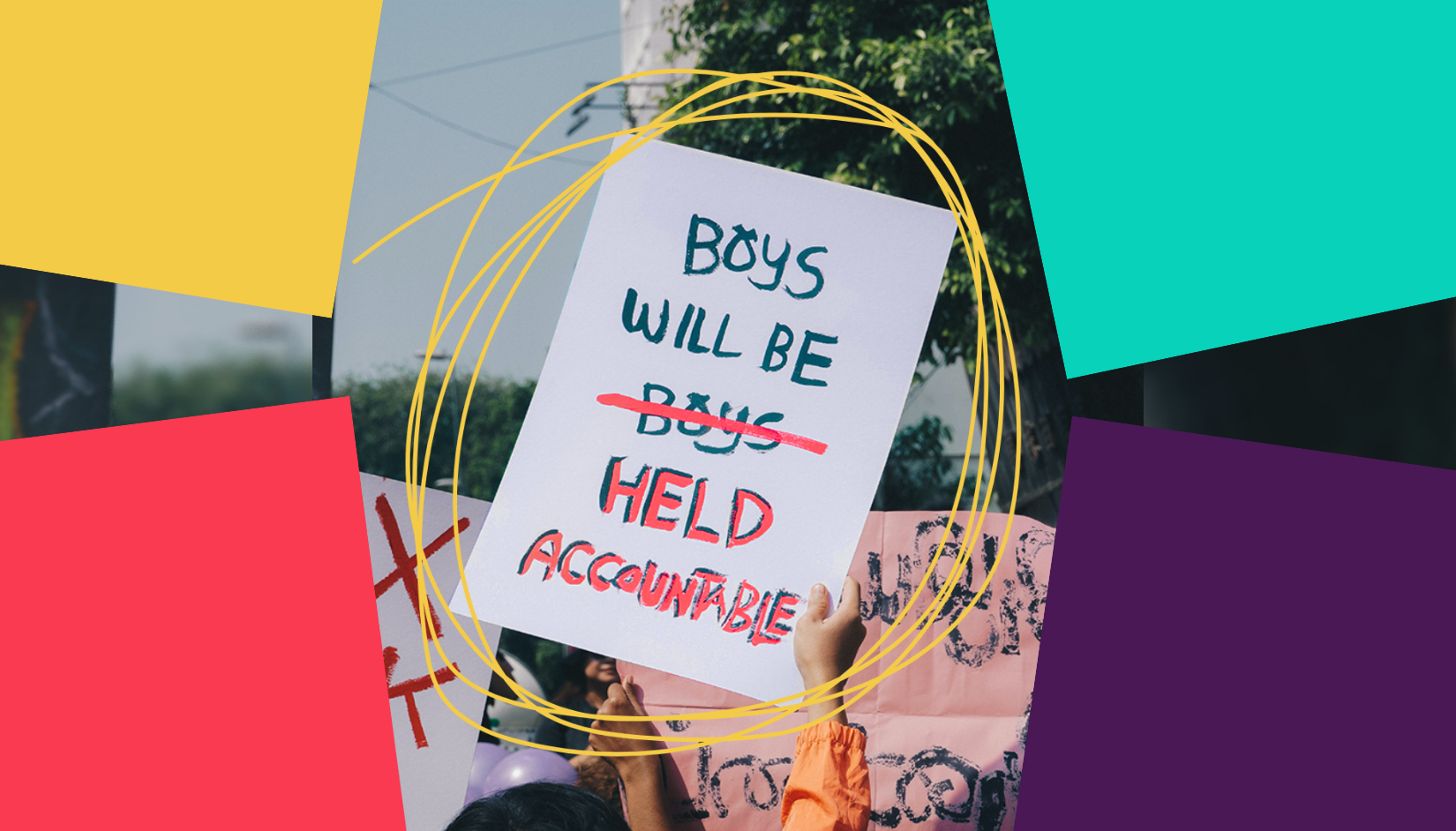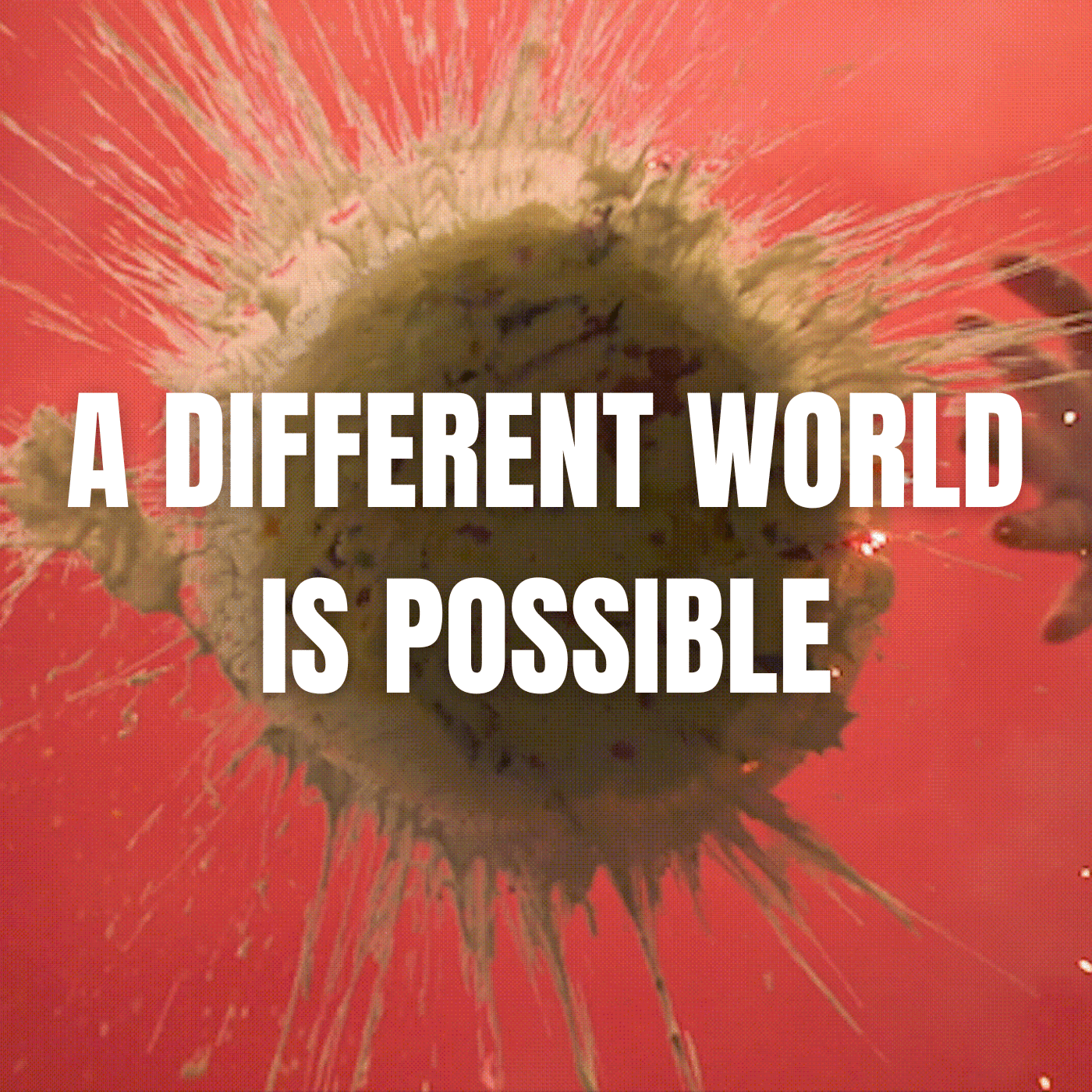 25 Nov
25 Nov
The End Violence Against Women Coalition was launched during the #16days of action in 2005, so we’ve been reflecting on our first 15 years, what we’ve done and how far there might be to go
Women come together – In 2005, a collection of frontline women’s organisations, researchers, lawyers and activists came together with a shared belief: that violence against women and girls is not inevitable, and Government could and should do a lot more to address it. We were tired of the Government’s piecemeal approach to this big social problem, which rarely went beyond criminal justice responses after the fact.
Scoring government efforts – We decided to set out the agenda of what needed to be done. And with the critical support of trade unions and human rights groups, EVAW was launched on 25 November 2005. Our first action was to hand deliver a scorecard to Downing Street on current Government efforts to end violence against women and girls – a measly 2/10.

Strategy secured – Over the next four years, we made the case to Government and the Opposition, with many of our members, and were delighted when Westminster’s first Violence Against Women and Girls Strategy was delivered in 2010 and renewed in 2016. This strategy is by no means perfect, and has suffered from being still very significantly a crime-centred approach, but it has absolutely led to some more joined up thinking in government, and key policy shifts including a change in the law on coercive control, some increased recognition of support services and the critical need for perpetrator intervention work.
Aiming to prevent abuse – EVAW set out early on to insist Government was ambitious and set out policy to prevent violence against women and girls before it happens – news to those with power who regard violence against women and girls as to some degree inevitable. We’ve done some really focused schools and universities work alongside our members, and have drawn attention to sexual harassment in schools, helped get Relationships & Sex Education made compulsory in schools in England, seen the child protection guidance for schools changed too so that sexual harassment and assaults by ‘peers’ are clearly covered, and pushed Universities UK to acknowledge and run a Taskforce on sexual violence on campuses.
Putting ‘VAWG’ centre-stage – EVAW has produced VAWG manifestos and corresponded with party leaders in every election. We have also exposed PCCs’ levels of commitment to tackling violence against women and girls. We feel it is important to name and talk about abuse of women in the public realm – something we all live with, and which is often tolerated or minimised by others – and have tried to put this into local election agendas as well as Parliament’s. This led to new initiatives on sexual harassment and assaults by Transport for London and National Rail. We also advised on action to address sexual harassment in politics and Parliament and pushed for better protection for women working in Westminster. Our work on sexism and racism in the media, in entertainment, online and constantly reproduced has been influential and led to changes in the law and in policy. We try to make the links with everyday normalised behaviour and attitudes – and investigated sexual ethics to do this.
‘Landmark Domestic Abuse Bill’ – In recent years the Domestic Abuse Bill has been a significant challenge to the women’s sector, because it forsakes the VAWG framework, and is in large part determinedly ungendered. But we have worked with our members and especially with the Step Up Migrant Women Coalition to try to use the legislation to get concessions and protections for migrant women – who are still subject to a hostile environment superseding any promise of protection for all women. This work is unfinished with some push in the Lords to come in 2021.
Rape justice has been a core part of EVAW’s campaigning. We are pushing for radical reform of the justice system’s response to rape survivors, including by taking legal action against the CPS for their failure to prosecute crimes of sexual violence. We supported the brilliant Fern Champion in her petition for increased counselling services for survivors of rape – still live and with nearly 200,000 signatures. Please keep sharing.
Pandemic – The world was turned upside down this year by the covid-19 pandemic, and we were struck by the concern from very early days about the possibility of increased violence against women in the context of lockdown: while the risk is very real, the perception of it did strike us as being a product of the years of awareness-raising work by women’s organisations and activists. Government had to respond. EVAW coalition members have done inspiring and humbling work to support women and girls during this period under extraordinarily difficult circumstances. EVAW and others have drawn attention to the threat of the pandemic to women and girls, and have pushed the Government on emergency funding and recognition of our sector’s work as core to every community.
Where are we now? – Today, EVAW has 99 members, 8 employees and 12 amazing board members and trustees. Sometimes the work feels insurmountable – the numbers of women harmed each year are not coming down. But we are proud of what we have achieved and of the big coalition of women around it. We know there is so much more work to do. In particular, we hope to continue to facilitate an environment amongst our members and the wider VAWG sector that is both reflective and reflexive to how we approach intersectionality and anti-racism – and ensure that when we say we are here for all women, we really mean it.
To our coalition members: Thank you for being part of EVAW, and for your tireless work to end violence against women and girls. We are so grateful for your continued commitment to this coalition, and we are excited about stepping into this next phase of EVAW’s journey with you.
Recommended ARTICLES
 25 Nov
25 Nov
 15 Nov
15 Nov
 12 Nov
12 Nov

